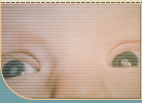
Frequently Asked Questions about Patching
Why do I have to put a patch on my child's eye that has nothing wrong with it?
If your child does not use the eye that was operated on, vision will be permanently lost. Unless that eye is forced to see, the other eye will start doing all the work. Wearing the patch over the non-operative eye will make the weaker eye work.
My child does not like his eye patched. What treatment can I try instead of patching? There is no other treatment. Patching is the only method to make the weaker eye work.
What can I do to help my child get used to patching?
• Feeling guilty and overwhelmed with pity for your child will make it difficult for you to carry out the very treatments which will protect his/her sight. You are in the same situation as parents of children with chronic problems such as asthma or diabetes who are called upon to administer medications daily.
• Patching will be hard, especially during the first few weeks. It will get easier for both you and your child if you keep patching every single day. Remember that consistent patching prevents blindness.
• Make patching routine. Try to patch at the same time of day. In this way you send the message that patching is a part of every day activities like brushing teeth.
• Entertain and distract your child by planning fun activities during patching times.
What might my child feel when patching begins? At first, the baby is really affected by the patch. This experience is new. He/she may feel frustrated, bored, insecure, annoyed. Going to sleep is a common response to feeling blindfolded.
Will my child try to take the patch off when he/she is older? Ordinarily a baby younger than 6 months will not try to remove the patch or resist you. After age 6 months, your child will probably go through a phase of trying to take the patch off and even putting it in his/her mouth. Eventually the child will become old enough to figure out a way to peel back the edges and make a peephole.
What should I do if I am having problems? It is very important to call the study coordinator as soon as you need help. Do not wait until the next study visit to voice your concerns. You will have lost precious time.

Patching
#1 - FAQ's
#2 - TIPS
#3 - Practicalities
#4 Video
Glasses
#1 Guidelines
#2 Spectacles
Contact Lenses
#1Contact Lenses
#2Contacts Video
Diary
#1 Eye Care Diary
#2 Detailed Diary Instructions
#3 Diary Video
Tips for Visual Acuity Testing